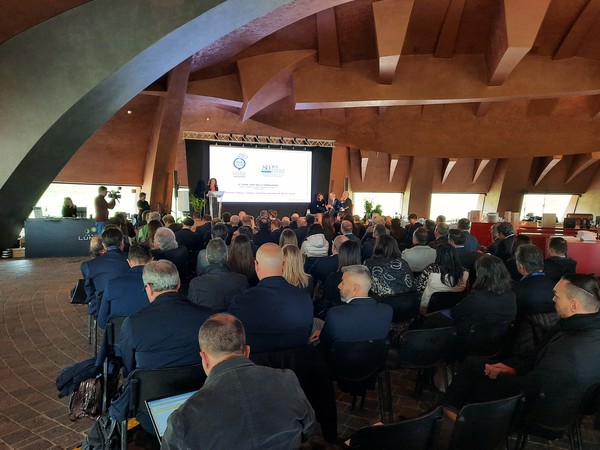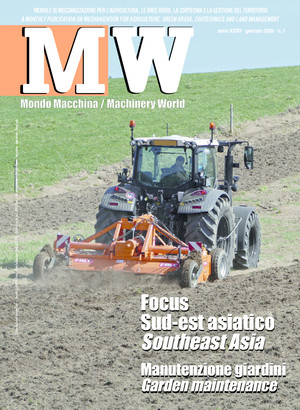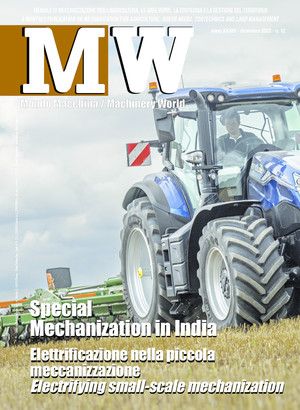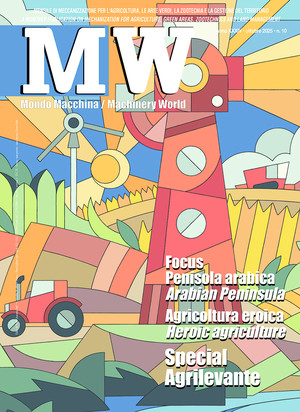
Strategies and tools for market challenges
FederUnacoma's annual Think Tank took place in Bevagna di Perugia and outlined the economic and geopolitical scenario affecting the agricultural machinery sector. Tariffs, market diversification and new consumer trends were the important topics of the day
"Economic, financial and geopolitical variables have a great influence on the life of companies, and they must take note of this. Yet, companies do not passively undergo economic events, but rather construe and deal with them with their own weapons". These words spoken by the general Manager of FederUnacoma, Simona Rapastella, opened the Think Tank on the topic: “Overhauling your business: strategies and tools for market challenges” held on 27 March at Tenuta Castelbuono (Bevagna, Perugia). The year 2025 appears set to be a particularly challenging year for the agricultural machinery and gardening sector. The domestic market as well as foreign markets, especially those in Europe and North America, are in decline. The decrease in sales of agricultural machinary is linked not only to the increase in production and logistics costs and to the economic instability discouraging investments, but - as was explained during the Think Tank conference - also to new geopolitical orders creating uncertainty in business strategies. In this scenario, agricultural mechanics is called upon to play an even more strategic role to provide those standards of quality and sustainability that are presently demanded of the agricultural world by consumers. “The agricultural machinery sector has always accompanied the growth and strengthening of the agricultural economy. Through research and innovation – said the president of FederUnacoma, Mariateresa Maschio, – manufacturers have created increasingly advanced machinery capable of streamlining agricultural processes by reducing inputs and improving the sustainability of processes. Today, however, companies face particularly enormous challenges. In fact, agriculture has advanced technological needs which, in a cyclical phase that is not very favorable to investments, still require the commitment of significant resources for R&D activities”.
Also accentuating the instability of the economic framework is the US policy aimed at discouraging imports by means of heavy tariffs. Washington's tariff barriers (currently suspended, ed.) would inevitably end up penalizing trade with Italy, for whom the United States is the main outlet market for a wide range of products, including agricultural machinery. “The American administration is at a crossroads. The import duties respond to the dual objective of bringing back to the United States some strategic industrial production, such as that in the automotive, pharmaceutical, steel and copper sectors, and of pushing third countries to finance the public debt that is the weak point of the US economy. This – explained the deputy director of the Corriere della Sera, Federico Fubini, – requires Italian companies to diversify their commercial strategies and seek new markets to compensate for any declines in the traditional ones”.
The plenary session of the Think Tank, which took place during the morning, concluded with a speech by Stefano Galli, global business partner of NielsenIQ, who analyzed the long-term market trends relating to the agro-industrial supply chains. “The latest projections indicate that by 2032 Asia will account for half of global private spending. The shift in consumption towards the East – Galli said – is due to the continent's demographic growth and the expansion of the middle class which is seeing its income increase”. According to Nielsen assessment, this greater spending capacity will also be oriented towards high-quality food products, following a trend already consolidated in the more developed economies. However, quality is not the only driver that guides consumer purchasing behaviors which, as Nielsen's study indicates, denote a growing sensitivity to environmental sustainability and economic and social sustainability.
In the afternoon, the Think Tank held round tables on three crucial topics for the competitiveness of companies: investments in research, generational turnover in company management and innovative marketing for the agricultural machinery sector.








